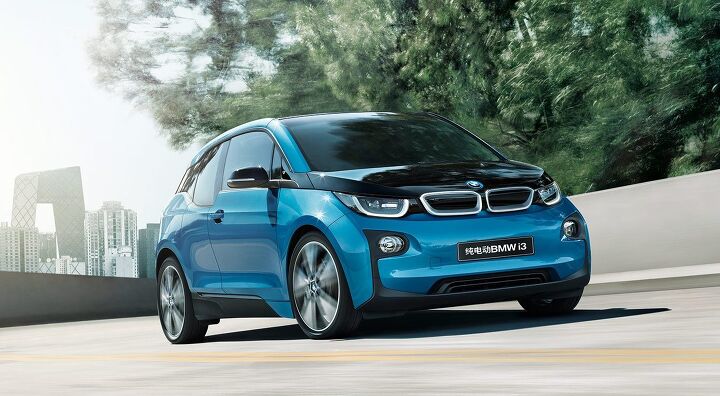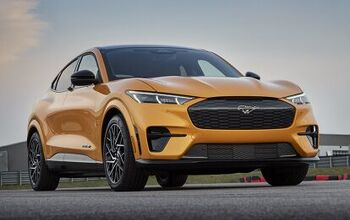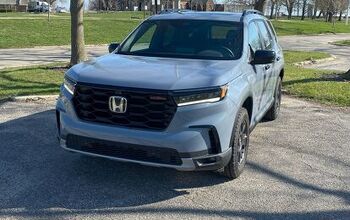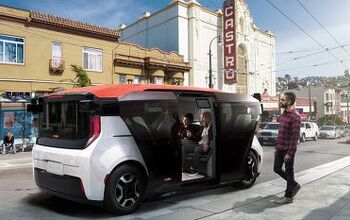BMW Considering Joint Electric Vehicle Venture in China

German luxury automaker BMW is seeking to establish a joint venture with China’s Great Wall Motor. The prospective deal focuses specifically on electric vehicles, according to sources familiar with the matter. A cooperative relationship with Great Wall would be BMW’s second in the world’s largest auto market – and a necessary one, as China forces all foreign automakers to team up with local partners in order to do business within the country.
Great Wall Motor Co. is China’s largest SUV maker by volume, and witnessed a nearly 20-percent rise in its share price on Wednesday after Asian media outlets reported it was in talks to partner with BMW.
Reported by Reuters, Bernstein analysts said that, given China’s aggressive push toward electrification and BMW’s pre-existing internal combustion sales, it’s believed any new venture would have to sell exclusively electric vehicles. It wouldn’t make much sense to bring in another gas-burning brand. Instead, experts claim BMW will sell EVs under the Mini badge.
“If an agreement were to be reached, we’d expect an arrangement like Denza (Mercedes-BYD), or VW-JAC, Ford-Zotye to be the most plausible outcome, whereby a new brand is used to sell EVs,” the analysts elaborated.
BMW already has a foot in the door with China. Working with Brilliance China Automotive Holdings, the German brand has two facilities in the Shenyang province already. A spokesman for the company confirmed it will continue working with Brilliance but was unwilling to discuss any plans with Great Wall.
However, an unnamed BMW executive already spilled the beans, saying, “We are in discussions with Great Wall about setting up a joint venture to produce cars in Changshu.”
BMW’s China sales grew 11.3 percent last year and it is currently the country’s second-largest premium brand. It’s currently trying to compete with Mercedes-Benz, which sells fewer vehicles overall but achieved 26.6 percent sales growth in China in 2016 — narrowing the gap. But BMW also wants mainstream success and EVs will play a major role in that.
The country wants electric and hybrid cars to comprise over one-fifth of its total auto sales by 2025. It’s so serious about this that it’s even considering loosening regulations on foreign automakers to achieve this goal. As a result, Tesla, General Motors, Ford Motor Co., and Daimler AG have all announced plans to build EVs in China.
“I don’t know how far along we have gone nailing this deal,” the BMW executive said. But Great Wall has already purchased a glut of lithium so that it can produce the batteries necessary to power upcoming models. It might not deal with BMW specifically but it’s clearly gearing up for battery-electric vehicles.
[Image: BMW]

A staunch consumer advocate tracking industry trends and regulation. Before joining TTAC, Matt spent a decade working for marketing and research firms based in NYC. Clients included several of the world’s largest automakers, global tire brands, and aftermarket part suppliers. Dissatisfied with the corporate world and resentful of having to wear suits everyday, he pivoted to writing about cars. Since then, that man has become an ardent supporter of the right-to-repair movement, been interviewed on the auto industry by national radio broadcasts, driven more rental cars than anyone ever should, participated in amateur rallying events, and received the requisite minimum training as sanctioned by the SCCA. Handy with a wrench, Matt grew up surrounded by Detroit auto workers and managed to get a pizza delivery job before he was legally eligible. He later found himself driving box trucks through Manhattan, guaranteeing future sympathy for actual truckers. He continues to conduct research pertaining to the automotive sector as an independent contractor and has since moved back to his native Michigan, closer to where the cars are born. A contrarian, Matt claims to prefer understeer — stating that front and all-wheel drive vehicles cater best to his driving style.
More by Matt Posky
Latest Car Reviews
Read moreLatest Product Reviews
Read moreRecent Comments
- AZFelix UCHOTD (Used Corporate Headquarters of the Day):Loaded 1977 model with all the options including tinted glass windows, People [s]Mugger[/s] Mover stop, and a rotating restaurant. A/C blows cold and it has an aftermarket Muzak stereo system. Current company ran okay when it was parked here. Minor dents and scrapes but no known major structural or accident damage. Used for street track racing in the 80s and 90s. Needs some cosmetic work and atrium plants need weeding & watering – I have the tools and fertilizer but haven’t gotten around to doing the work myself. Rare one of a kind design. No trades or low ball offers – I know what I got.
- El scotto UH, more parking and a building that was designed for CAT 5 cable at the new place?
- Ajla Maybe drag radials? 🤔
- FreedMike Apparently this car, which doesn't comply to U.S. regs, is in Nogales, Mexico. What could possibly go wrong with this transaction?
- El scotto Under NAFTA II or the USMCA basically the US and Canada do all the designing, planning, and high tech work and high skilled work. Mexico does all the medium-skilled work.Your favorite vehicle that has an Assembled in Mexico label may actually cross the border several times. High tech stuff is installed in the US, medium tech stuff gets done in Mexico, then the vehicle goes back across the border for more high tech stuff the back to Mexico for some nuts n bolts stuff.All of the vehicle manufacturers pass parts and vehicles between factories and countries. It's thought out, it's planned, it's coordinated and they all do it.Northern Mexico consists of a few big towns controlled by a few families. Those families already have deals with Texan and American companies that can truck their products back and forth over the border. The Chinese are the last to show up at the party. They're getting the worst land, the worst factories, and the worst employees. All the good stuff and people have been taken care of in the above paragraph.Lastly, the Chinese will have to make their parts in Mexico or the US or Canada. If not, they have to pay tariffs. High tariffs. It's all for one and one for all under the USMCA.Now evil El Scotto is thinking of the fusion of Chinese and Mexican cuisine and some darn good beer.

































Comments
Join the conversation
By "forces" you also mean "give up all technological know-how." For a country that stands in front of the world's stage and has its leader lecture everybody else on free trade, they're not quick to actually practice it in their own country. And if you don't comply and attempt to actually sell something in China made in another country, prepare for steep tariffs. GBMW-> Great Bayerische Motor Wall...doesn't quite roll off the tongue...